Photographs: Reuters
According to the latest revelations made by whistleblower website WikiLeaks, the crown prince of Abu Dhabi described Pakistan President Asif Ali Zardari as 'dirty but not dangerous' and former prime minister Nawaz Sharif as 'dangerous but not dirty'.
In July 2009, Abu Dhabi Crown Prince Mohammed bin Zayed, deputy supreme commander of the United Arab Emirate's armed forces and de facto defence chief, said that Zardari was 'dirty but not dangerous', The Nation reported.
Sharif was 'dangerous but not dirty -- this is Pakistan', maintained Zayed, adding that the former premier, who heads the main opposition party to Zardari, could not be trusted to honour his promises.
Palin slams Obama
Image: Cutouts of US President Barack Obama, former Alaska governor Sarah Palin and Michelle ObamaPhotographs: Reuters
Former Alaska governor Sarah Palin has blasted US President Barack Obama for the failure of his administration to stop the latest WikiLeaks release.
The documents of classified US State Department cables released on Sunday are the result of the "Obama administration's incompetent handling of this whole fiasco," Politico quoted Palin as saying on Facebook.
She further said that administration officials could have protected private documents by taking more aggressive action against WikiLeaks.
Calling WikiLeaks founder Julian Assange 'an anti-American operative with blood on his hands,' Palin asked, "Why was he not pursued with the same urgency we pursue Al Qaeda and Taliban leaders?"
"It's of course important that we do all we can to prevent similar massive document leaks in the future. Why did the White House not publish these orders after the first leak back in July? What explains this strange lack of urgency on their part," Palin wrote.
Iran leader Khamenei has cancer?
Image: Students take part in a demonstration as one of them holds pictures of Iran's Supreme Leader Ayatollah Ali KhameneiPhotographs: Reuters
US diplomatic cables released by WikiLeaks include remarks of an Iranian informant telling American officials in 2009 that Iran's Supreme Leader Ayatollah Khamenei had terminal cancer and could die within months.
Ayatollah Khamenei, the chief religious leader of Iran, holds the final word in state affairs. He is a hardliner well-known to be hostile to America. Details of the health and lifestyle of the 71-year old leader continue to remain a mystery.
According to the Telegraph, an American official in Istanbul reported in August, 2009 that a businessman close to former Iranian President Ayatollah Hashemi had said that the Supreme Leader was diagnosed with a fatal form of leukaemia.
Ayatollah Khamenei has frequently been rumoured to have had cancer treatment. His opponents have also circulated rumours of his opium addiction.
China's ultimate plan for North Korea
Image: Protesters burn North Korean flags and portraits of North Korean leaders in SeoulPhotographs: Reuters
A new, younger generation of Chinese leaders "would be comfortable with a reunited Korea controlled by Seoul and anchored to the United States in a benign alliance", a diplomat has said.
In fact, China's assessment of North Korea has often been startlingly wrong, the cables show.
According to the New York Times, the documents help explain why some South Korean and American officials suspect that the missile attack on a South Korean island last week may be the last snarls of a dying dictatorship.
The cables reveal that in private, the Chinese, long seen as North Korea's last protectors against the West, occasionally provide the Obama administration with colourful assessments of the state of play in North Korea.
Chinese officials themselves sometimes even laugh about the frustrations of dealing with North Korea.
But the Chinese official reported that although North Korean leader Kim Jong-il had apparently suffered a stroke and had obviously lost weight, he still had a 'sharp mind' and retained his reputation among Chinese officials as 'quite a good drinker'.
The cables show that when it comes to the critical issue of succession, even the Chinese know little of the man who would be North Korea's next ruler: Kim Jong-un.
Pakistan obama's 'private nightmare'
Image: US President Barack ObamaPhotographs: Reuters
United States President Barack Obama considers Pakistan as his 'private nightmare', according to one of the cables released by WikiLeaks.
"He (Obama) described Pakistan as his private nightmare, suggesting the world might wake up one morning with everything changed, following a potential Islamic extremist takeover," The News quoted one of the cables as saying.
Obama expressed his concerns about Pakistan in two consecutive meetings with ranking US Senator Codel Casey and Congressman Gary Ackerman of the House's Foreign Relations Committee before their visit to Israel for a meeting with Defence Minister Ehud Barak last year.
When asked if the use of force on Iran might backfire with moderate Muslims in Pakistan, thereby exacerbating the situation, "Barack acknowledged that Iran and Pakistan are interconnected, but disagreed with a causal chain."
"By avoiding confrontation with Iran, Barack argued, the US faces a perception of weakness in the region," stated the cable
To the contrary, Obama argued that if the US had directly confronted North Korea in recent years, others would be less inclined to pursue nuclear weapons programmes.
Prince Charles not as respected as the Queen
Image: Britain's Prince Charles is presented with a portrait of himselfPhotographs: Reuters
Prince Charles 'does not command the same respect' as Britain's Queen, according to a Wikileaks cable, which quoted an Indian-origin senior official with the Commonwealth secretariat as telling this to a United States diplomat.
Amitav Banerji, the Commonwealth secretariat director of political affairs, in fact, used talks with the US embassy political officer in London to cast doubt on Prince Charles's suitablity to succeed the British Queen as head of the 54-nation association, The Guardian reported, citing the leaked cable.
Banerji said the Commonwealth "was trying quietly to get him more involved in Commonwealth affairs", according to the cable sent to Washington in June 2009.
It added, "Banerji acknowledged that succession of the head of the Commonwealth would have to be dealt with when Queen Elizabeth passes, as there is no rule stipulating that the British monarch is the head and no procedure for selecting a new head."

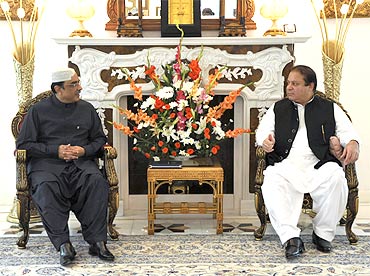
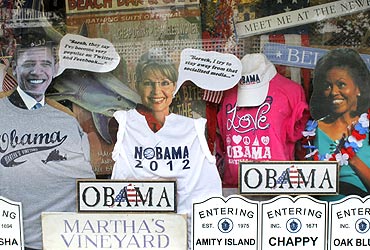
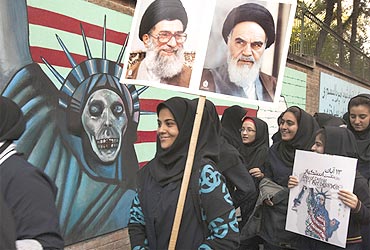
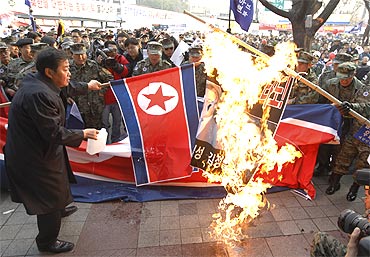
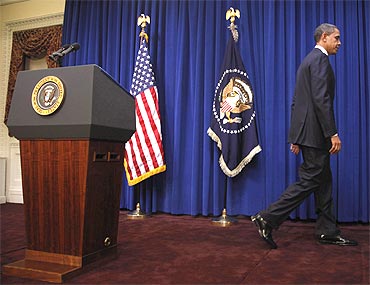
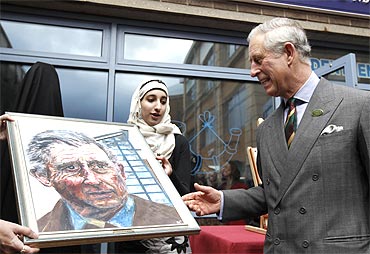
article